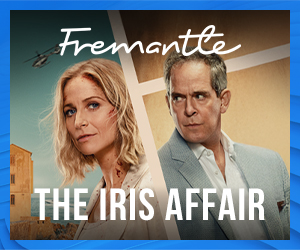
Thai executive producer, Maker-Y’s Yossinee Na Nakorn, has given the market reinterpretations of well-loved romances like "The Frenemy" and "My Secret Bride". Between those and 2023’s "To the Moon and Back", she has honed her taste for character-driven stories, more complex motivations and universal themes.
Yossinee Na Nakorn – second-generation Thai filmmaker and executive producer of blockbuster Thai drama series, including "The Frenemy" and "My Secret Bride" – talks about following in her mother’s footsteps, crafting her own style, her latest drama series, "Matalada" ("To the Moon and Back"), and bringing to life stories that are flying the flag for Thai content around the world.
Your mother made the original "The Frenemy", about two women and a man they are both involved with. You remade the series about four years ago. What did "The Frenemy" mean to you as a filmmaker and what was it like following in your mother’s filmmaking footsteps? “The first version of "The Frenemy" was made many years ago by my mom and then I remade it four years ago. A lot changed in between. "The Frenemy" was adapted from a novel. My mom respected the novel, and didn’t have many adaptations. Her version is more situation driven, didn’t really dig deep into the characters. We know who they are, what they’re doing, and how they’re doing it; it’s mostly about winning over a guy.
When I produced "The Frenemy", the whole industry had changed, the market, the audience, everything was different. What was most challenging for me was how to tell the story of a guy whose wife and mistress are friends. The novel was told through the diary of the ‘good girl’. I didn’t see "The Frenemy" as the story of two girls winning over one guy. I saw The Frenemy as the story of two girls with a friendship that is so tight. I wanted to tell the story from the diary of the ‘bad girl’ as well.
As a content creator today, I cannot just go with the situation and not let the characters tell their stories because it won’t connect with the audience.
"The Frenemy" was one of the first times that I worked really really hard character-wise to make sure I knew what was in the mind of each character, what their motivations were, and what they wanted me to tell. Towards...
Thai executive producer, Maker-Y’s Yossinee Na Nakorn, has given the market reinterpretations of well-loved romances like "The Frenemy" and "My Secret Bride". Between those and 2023’s "To the Moon and Back", she has honed her taste for character-driven stories, more complex motivations and universal themes.
Yossinee Na Nakorn – second-generation Thai filmmaker and executive producer of blockbuster Thai drama series, including "The Frenemy" and "My Secret Bride" – talks about following in her mother’s footsteps, crafting her own style, her latest drama series, "Matalada" ("To the Moon and Back"), and bringing to life stories that are flying the flag for Thai content around the world.
Your mother made the original "The Frenemy", about two women and a man they are both involved with. You remade the series about four years ago. What did "The Frenemy" mean to you as a filmmaker and what was it like following in your mother’s filmmaking footsteps? “The first version of "The Frenemy" was made many years ago by my mom and then I remade it four years ago. A lot changed in between. "The Frenemy" was adapted from a novel. My mom respected the novel, and didn’t have many adaptations. Her version is more situation driven, didn’t really dig deep into the characters. We know who they are, what they’re doing, and how they’re doing it; it’s mostly about winning over a guy.
When I produced "The Frenemy", the whole industry had changed, the market, the audience, everything was different. What was most challenging for me was how to tell the story of a guy whose wife and mistress are friends. The novel was told through the diary of the ‘good girl’. I didn’t see "The Frenemy" as the story of two girls winning over one guy. I saw The Frenemy as the story of two girls with a friendship that is so tight. I wanted to tell the story from the diary of the ‘bad girl’ as well.
As a content creator today, I cannot just go with the situation and not let the characters tell their stories because it won’t connect with the audience.
"The Frenemy" was one of the first times that I worked really really hard character-wise to make sure I knew what was in the mind of each character, what their motivations were, and what they wanted me to tell. Towards the end of the story, we see the reason why she’s doing what she does, and the audience connects right away. They really loved it. To tell stories today through drama, you need to lean toward character-driven stories. That’s what "The Frenemy" taught me.”
If you made "The Frenemy" today, is there anything you would have done differently? “I think I would not have the main character go back to her husband after he cheated on her.”
Your next series was "My Secret Bride" (2019), another remake of one of your mother’s shows about a girl in a slum community who becomes a spy for her employer, an undercover police officer. How did you approach this one? “My Secret Bride was first made by my mom when I was in school. It was remade a second time by another company when I was in college, and mine was the third. We reinterpreted the whole story. I went back to the novel and what caught me the most were the strong characters – and not just the leads, but all of them. There was room to explore. This was also the first time we didn’t follow the novel’s story framework. We dug deep into the why of each character and what they all wanted, not just the lead characters... What’s so much fun about this story that I dig deep into the group of the antagonist, not just the lead characters... ... usually we only know that the bad guys in Thai drama series are greedy or they are jealous. But we never dig deep into why they’re doing anything. The last episode, when the four bad guys go into court and disclose why they have done this, went viral... it speaks so well to the audience today. Because we acknowledge the common problem that the audience has, and that’s the common problem with the character... that’s the way I need to be as a storyteller today.”
What’s so appealing about remaking your mothers’ work? “I didn’t really look at my mom’s work as my mom’s. I looked at the story and as a producer she picked good stories, good projects, especially these two. They appealed to me as a storyteller. My mom actually suggested "My Secret Bride"... Those are the only two [of more than 10 that I have made] that I remade from my mom.”
Fast forward to your latest series, romantic drama "To the Moon and Back" ("Matalada"), which releases in 2023... “To the Moon and Back is about a girl (Matalada, played by Jarinporn Joonkiat) born into a LGBTQ family and raised against a backdrop of drag shows. To the world, her family may be considered incomplete, imperfect. The lead actor (played by James Jirayu) is born into a perfect family with a seemingly perfect life. But she’s the one who heals everyone... It’s not about winning over love. It’s not about the big big problems. It’s about a girl who will come into your life and suggest how you could live a happier life.”
Why did you choose it? “To the Moon and Back is my most challenging project yet. I divide my work into two eras – the first eight years and the last eight years. The first eight years were like analogue, solid, really safe and sound before all this disruption. And then the last eight years it was like I jumped off the mountain and just started climbing back.”
“The problem we address in "To the Moon and Back" is authentic, true to human needs. There are no guns pointing in your face, there are no explosions, no deals anyone needs to close... in film school, we are always taught to pick situations that are big enough for people to care about. To the Moon and Back deals with the biggest problem to today’s audience: answering a question we keep asking ourselves, ‘why am I not happy?’ This question today is very important... it’s really challenging for me to put this question into dialogue and action.”
What kinds of stories inspire you? “I always lean towards the story with strong characters. I love problems that are human, the character that has room for me to dig deep into the reasons they are behaving in certain ways. By telling their stories, it might speak to my audience and it might give something out that is good for them, healing them....”
When you think about a drama, do you think about the Thai market or do you think about the regional/international footprint? “Today, I think about a good story for Thai audiences that can be translated for an international audience as well. That’s why I focus more on people, on characters... We all love, we get heartbroken. There are things we all have in common. I feel I have more responsibilities as a Thai content provider to provide content that translates well for the international market and represents the Thai market too.”



























